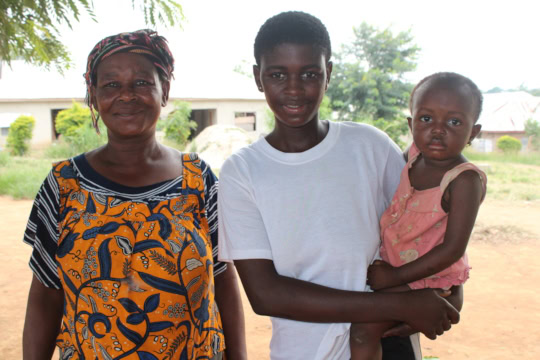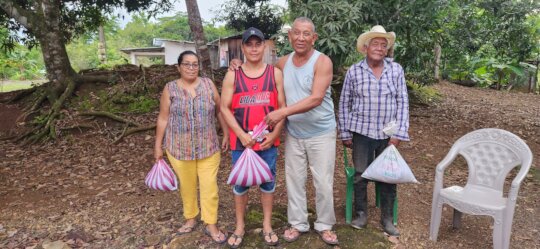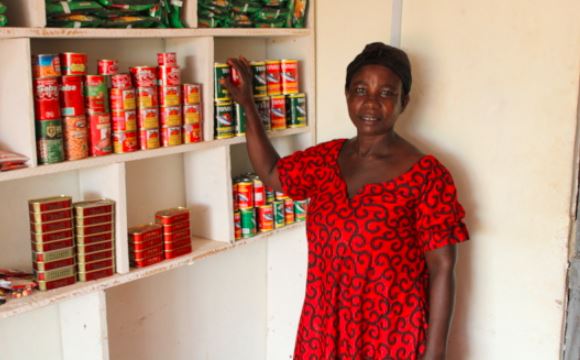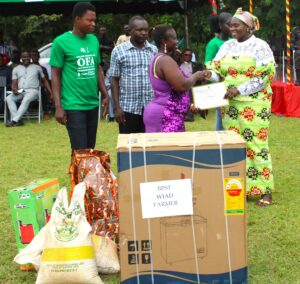Palestina Now Has a Chlorination System
By Orlando Jose Montiel Salas | Clean Water Program Officer
Palestina is a small rural community in the municipality of El Almendro, in Río San Juan, Nicaragua.
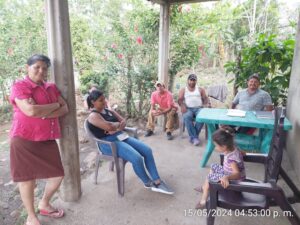
Palestinas CAPS Board of Members having a meeting
It is located on the edge of the road that leads to Nueva Guinea. This community consists of 33 houses in which 132 people live, all of humble and hardworking origins from the countryside. For six months they have had a new drinking water system built by the Municipal Mayor’s Office.
The water comes from a drilled well with a submersible electric pump. Previously water was drawn from the well with a manual rope pump. Each family had to go to the well to get water to transport to their home. It was usually the women and girls who carried out the tasks of pumping and transporting water to their homes. The new well pumps water to the houses of the community through pipes which were installed by staff of the Mayor’s Office and the residents. The families are happy because they no longer have to make a long walk to the well and carry water in plastic containers, usually on their heads.
The next step was to obtain higher quality water. The members of the community water committee (CAPS) and the community assembly decided to look for options to purify the water.
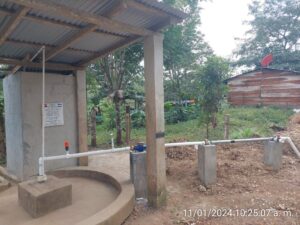
Palestinas New Water System
The first method they considered was to install a chlorination system with an electric pump, which is tedious to install and use. The second method was to install a manual chlorinator with chlorine tablets, the type promoted by Self-Help International. After considering the pros and cons of each method, the CAPS members chose the manual tablet chlorinator, because it was cheaper and easier to use. This was according to Bayardo, who is the technician with the Mayor’s Office. He had worked with this technology in another community and believed that it was definitely better than any other and much cheaper.
Finally, Bayardo in consensus with the populace and CAPS directors of the Palestina community, made the decision to acquire the tablet chlorinator, because it is easy to use, works well, is not easily damaged, and has a relatively low cost (U$87) compared to an electric chlorination device, which would cost more than US$500.
The challenge of installing the chlorinator was great, since the only feasible place to place it was
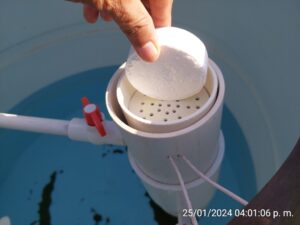
The New Chlorinator System Installed by SHI
in the water distribution tank itself, which sits on a tower raised six meters above the ground. In the end, though, it was installed and the community has safe water in their homes.
Currently the CAPS of Palestina has used only 3 chlorine tablets in the four months since the chlorinator was installed, which means that each tablet has lasted 40 days. The water distribution tank has a capacity of 5,000 liters is filled twice a day, so a total of 10,000 liters of safe water is made available to the community daily.
The directors of the CAPS and residents of Palestina are happy with the water they are drinking today, since the women do not have to go out of their homes to get it, and thus they are not exposed to any danger on the road. The cost of chlorinating and making the water drinkable is no more than $1.85 córdobas (US$.05) per family per month, which is extremely cheap compared to other chlorination systems.
In addition, the quality of water for human consumption is excellent, due to the efficiency and
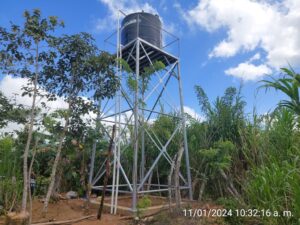
The Water Storage Tank Holding The Chlorinator
operation of the tablet chlorinator and the good maintenance that the CAPS gives it, ensuring a constant supply of chlorine tablets. This is verified by checking the level of free residual chlorine in the taps of the beneficiary homes with a meter.
The results demonstrate the efficiency of water purification, with values ranging from 0.39 to 0.49 milligrams of chlorine in each liter of water that flows from the water distribution tank to each house in the system. This level of residual chlorine means the water is free of contamination and safe for humans to drink.

